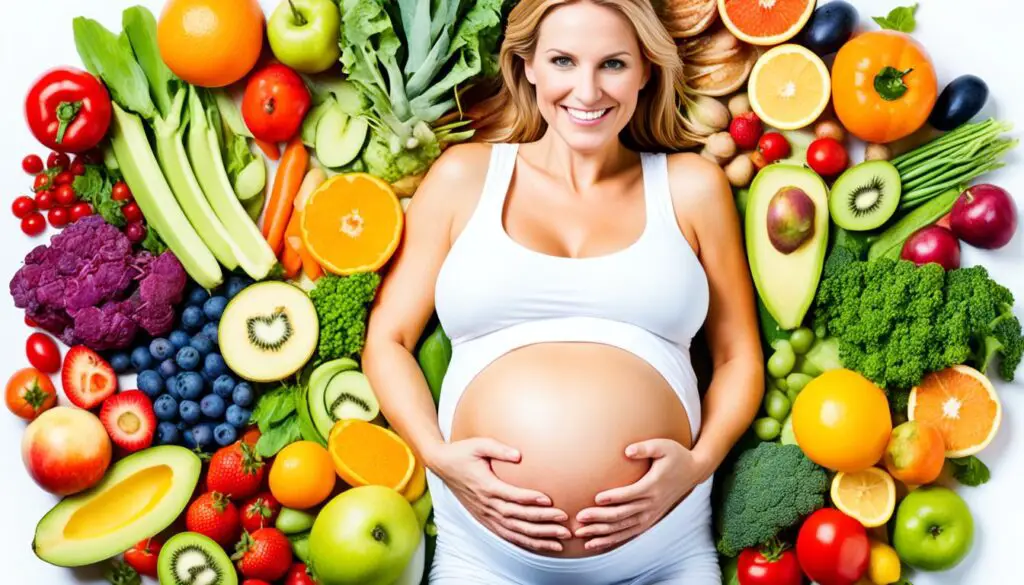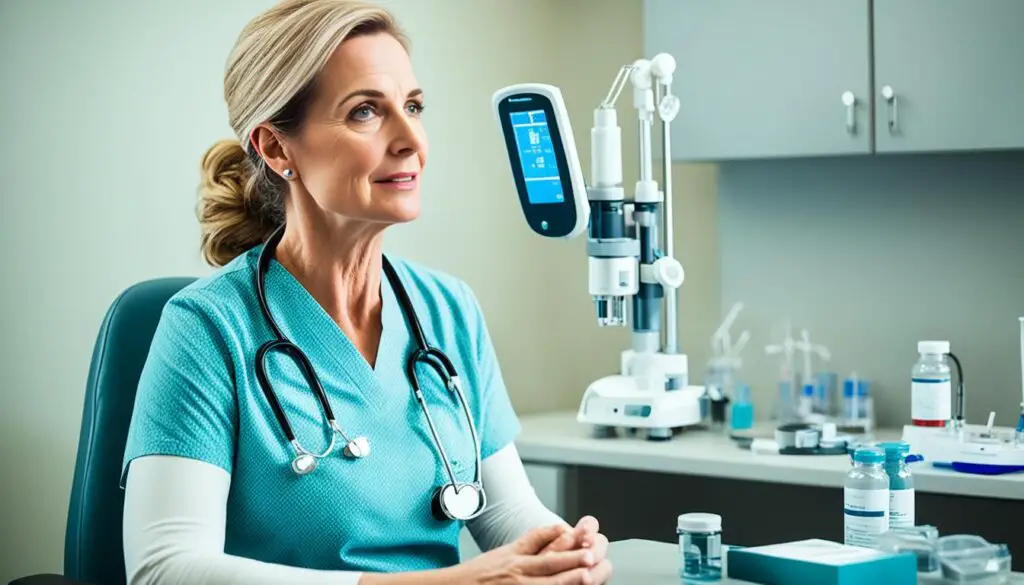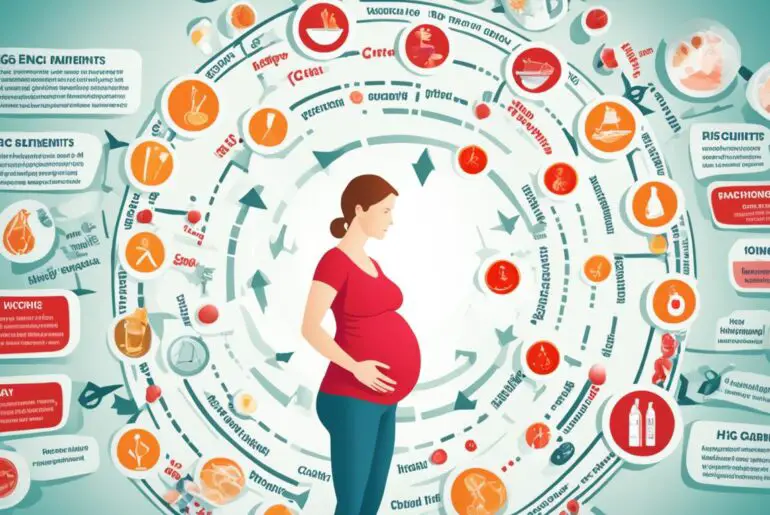Did you know that the HCG diet involves consuming only 500 calories per day? This extreme weight loss method has gained popularity in recent years, but when it comes to pregnancy, following the HCG diet is not recommended. Maintaining a healthy pregnancy diet is crucial for the well-being of both the mother and the baby.
Key Takeaways:
- The HCG diet involves consuming only 500 calories per day.
- The HCG diet is not recommended during pregnancy.
- Pregnant women should focus on maintaining a healthy pregnancy diet.
- Consult with a healthcare professional for personalized nutrition advice during pregnancy.
- It is important to prioritize overall well-being before becoming pregnant.
The Safety of the HCG Diet
When it comes to maintaining a healthy pregnancy, nutrition plays a crucial role. However, it’s important to make informed choices about the safety of certain diets during pregnancy. One such popular diet is the HCG diet, which involves a low calorie intake and the use of the human chorionic gonadotropin (HCG) hormone.
But is the HCG diet safe during pregnancy?
The answer is no. The HCG diet is not considered safe during pregnancy due to its potential risks for both the mother and the baby. The HCG hormone is naturally produced during pregnancy, but following the HCG diet during pregnancy can lead to hormonal imbalances and nutritional deficiencies. Additionally, the low calorie intake associated with the diet can deprive the mother and baby of the essential nutrients they need for proper growth and development.
If you are pregnant or planning to become pregnant, it is crucial to prioritize safe and healthy nutrition for yourself and your baby. Consult with a healthcare professional, such as an OB/GYN, before starting any diet during pregnancy. They can provide personalized advice and guide you towards a well-rounded pregnancy nutrition plan.
It is important to consult with a healthcare professional before starting any diet during pregnancy to ensure the safety of both the mother and the baby.
During pregnancy, focus on a balanced and nutrient-rich diet that includes a variety of fruits, vegetables, whole grains, lean proteins, and dairy products. These provide the necessary vitamins, minerals, and macronutrients for a healthy pregnancy. The HCG diet, with its drastic calorie restrictions and hormonal changes, should be avoided during this time.
Remember, the safety and well-being of both you and your baby are of utmost importance.
Risks of the HCG Diet During Pregnancy
Let’s dive deeper into the potential risks of the HCG diet during pregnancy:
| Risks | Explanation |
|---|---|
| Hormonal Imbalances | The excess HCG hormone from the diet can disrupt the delicate hormonal balance during pregnancy, potentially leading to complications. |
| Nutritional Deficiencies | The low calorie intake of the diet may not provide adequate nutrients for the healthy development of the baby and can leave the mother deficient in essential vitamins and minerals. |
| Weight Loss Concerns | Pregnancy is not the time for drastic weight loss. It is important for pregnant women to gain weight within the recommended range to support the growth and development of the baby. |
Given these potential risks, it is best to avoid the HCG diet during pregnancy and focus on safe pregnancy nutrition. Consult with a healthcare professional for personalized guidance to ensure both you and your baby receive the nutrients necessary for a healthy pregnancy.
HCG Diet Before Pregnancy

If you are considering trying the HCG diet, it is best to do so before becoming pregnant. The low calorie intake of the diet may not provide enough nutrients for a developing baby. Prioritize maintaining a healthy pregnancy diet that includes a balanced intake of nutrients to support your own body and future pregnancy.
Benefits of HCG Diet Before Pregnancy:
- Facilitates weight loss, which can improve fertility.
- Allows you to adopt healthier eating habits before conceiving.
- Helps regulate hormone levels, enhancing chances of successful conception.
“By focusing on a healthy pregnancy diet before you become pregnant, you can ensure that your body is adequately nourished to support a successful and healthy pregnancy.” – Dr. Emma Johnson, OB/GYN
Prioritizing a balanced diet rich in essential nutrients prepares your body for the upcoming demands of pregnancy. It also establishes a solid foundation for fetal development by providing the necessary vitamins, minerals, and macronutrients.
It is important to note that every woman’s nutritional needs are unique. Consulting with a healthcare professional, such as an OB/GYN, can guide you in tailoring a pre-pregnancy diet plan suited to your specific requirements.
Example of a Pre-Pregnancy Nutrition Plan:
| Food Group | Serving Size | Examples |
|---|---|---|
| Protein | 3-4 ounces | Lean meats, poultry, fish, beans, tofu |
| Whole Grains | 1 cup, cooked | Brown rice, quinoa, whole wheat bread |
| Fruits | 1 cup | Berries, oranges, bananas |
| Vegetables | 2-3 cups | Leafy greens, broccoli, carrots |
| Dairy or Alternatives | 1-2 cups | Low-fat milk, yogurt, cheese |
| Fats and Oils | 2-3 tablespoons | Olive oil, avocado, nuts |
Remember, healthy eating habits should continue throughout pregnancy. Prioritizing nutrition and seeking professional advice can help ensure the health and well-being of both you and your future baby.
Fertility Benefits of the HCG Hormone
The HCG hormone, also known as human chorionic gonadotropin, has shown promising results in treating fertility issues in women. Its role in fertility treatment involves stimulating the production of eggs from the ovaries, increasing the chances of successful conception.
Research has shown that HCG therapy for fertility can be an effective option for women who are struggling to get pregnant. By promoting ovulation and improving egg quality, HCG hormone injections can enhance the chances of successful fertilization and pregnancy.
“HCG therapy has been a game-changer for many couples struggling with fertility issues,” says Dr. Sarah Johnson, a renowned fertility specialist. “By administering the HCG hormone, we can address underlying hormonal imbalances and help women achieve their dream of starting a family.”
However, it is important to note that while the HCG hormone can be beneficial for fertility treatment, it is not recommended for use during pregnancy. If you are following the HCG diet and subsequently become pregnant, it is crucial to discontinue the diet immediately. The excessive levels of HCG hormones that result from the diet can have adverse effects on the developing fetus.
Consulting with a fertility specialist or reproductive endocrinologist is essential when considering HCG therapy for fertility. They can evaluate your individual situation and provide personalized recommendations based on your specific needs and medical history.
Fertility Benefits of the HCG Hormone:
- Stimulates ovulation
- Improves egg quality
- Enhances chances of successful fertilization and pregnancy
Remember, the use of HCG for fertility purposes should always be done under the supervision and guidance of a qualified healthcare professional to ensure the best possible outcomes and to mitigate any potential risks.
Consulting with a Healthcare Professional

When it comes to nurturing a healthy pregnancy, seeking guidance from a healthcare professional is paramount. By consulting with an OB/GYN or another qualified expert, you can receive personalized nutrition tips and advice on maintaining an optimal pregnancy diet. Remember, every woman’s body and nutritional needs are unique, so it’s important to tailor your diet to ensure the well-being of both you and your baby.
By partnering with a healthcare professional, you’ll have access to evidence-based recommendations and the latest information on prenatal nutrition. They can help you navigate the do’s and don’ts of pregnancy nutrition, informing you on the best foods to eat, portion sizes, and any specific dietary requirements you may have. Their expertise will equip you with the knowledge needed to make informed decisions for the health of both you and your baby.
Personalized Nutrition Tips for Pregnant Women
During your consultation, your healthcare professional may provide recommendations tailored to your specific needs and circumstances. However, here are some general nutrition tips for pregnant women to get you started:
- Ensure you’re consuming a well-balanced diet that includes a variety of fruits, vegetables, whole grains, lean proteins, and healthy fats.
- Stay hydrated by drinking plenty of water throughout the day.
- Avoid foods that are high in saturated fats, added sugars, and sodium.
- Include foods rich in essential nutrients such as folate, iron, calcium, and omega-3 fatty acids.
- Listen to your body’s hunger and fullness cues and eat smaller, more frequent meals to help alleviate common pregnancy discomforts.
Remember, these tips are just a starting point, and individualized guidance from a healthcare professional is crucial for optimal prenatal nutrition.
“Consulting with a healthcare professional ensures that you receive the guidance and support necessary to maintain a healthy pregnancy diet. They can help you understand your body’s specific needs, address any concerns, and provide advice that is relevant to your unique circumstances.”
| Nutrient | Sources | Benefits |
|---|---|---|
| Folate | Leafy greens, citrus fruits, legumes | Crucial for the baby’s neural tube development |
| Iron | Lean meats, fortified cereals, legumes | Essential for the production of red blood cells and oxygen transport |
| Calcium | Dairy products, fortified alternatives, leafy greens | Supports the development of the baby’s bones and teeth |
| Omega-3 Fatty Acids | Fatty fish, walnuts, chia seeds | Promotes brain and eye development in the baby |
Healthy Pregnancy Care
When it comes to ensuring a healthy pregnancy, seeking care from an OB/GYN is crucial. These medical professionals specialize in providing comprehensive support and guidance throughout the entire pregnancy journey. From the early stages of conception to postpartum care, an OB/GYN can address any concerns or questions you may have, including maintaining a healthy pregnancy diet that supports the well-being of both the mother and the baby.
During your appointments with an OB/GYN, you can expect to receive valuable information and personalized advice on nutrition during pregnancy. They will help you understand the importance of maintaining a balanced diet that provides all the necessary nutrients for your body and the developing baby. Additionally, they can address any specific concerns related to weight gain, weight loss, and other health issues that may arise during and after pregnancy.
Benefits of OB/GYN Pregnancy Care:
- Comprehensive support and guidance throughout the pregnancy journey
- Expert advice on maintaining a healthy pregnancy diet
- Addressing concerns about weight gain, weight loss, and other health issues
- Promoting the well-being of both the mother and the baby during and after pregnancy
Seeking care from an OB/GYN ensures that you receive the necessary medical attention during this critical time. They will monitor your health and the development of the baby, perform regular check-ups, and address any potential issues that may arise. Remember, a healthy pregnancy starts with proper care and a balanced diet.
“The care provided by an OB/GYN during pregnancy is essential for the well-being of both the mother and the baby.”
Preparing for Pregnancy

If you are planning to become pregnant, it is crucial to prioritize your overall health and wellness before conceiving. This includes focusing on weight loss before pregnancy and engaging in pre-pregnancy planning to ensure the best possible start for you and your future baby.
Weight loss before pregnancy:
Attaining a healthy weight before getting pregnant can have numerous benefits for both you and your baby. Excess weight could increase the risk of complications during pregnancy, such as gestational diabetes and high blood pressure. Therefore, it is advisable to incorporate healthy lifestyle habits, including a balanced diet and regular exercise, to achieve and maintain a healthy weight.
Pre-pregnancy planning:
Prior to becoming pregnant, engaging in pre-pregnancy planning can significantly contribute to a smooth and healthy conception. It involves taking steps to optimize your health, such as visiting a healthcare professional for a preconception check-up, quitting smoking, and managing any chronic conditions. By addressing these factors in advance, you can increase your chances of a successful and healthy pregnancy.
It is important to note that extreme diets, such as the HCG diet, are not recommended when planning for pregnancy. These restrictive eating plans may not provide the necessary nutrients for a healthy pregnancy. Instead, focus on a well-rounded, nutritious diet that includes a variety of fruits, vegetables, lean proteins, whole grains, and healthy fats.
By prioritizing weight loss before pregnancy and practicing pre-pregnancy planning, you can create a solid foundation for a healthy and successful journey to motherhood.
The Importance of Well-Woman Checkups

Regular well-woman checkups, including Pap smears, play a vital role in maintaining women’s health. These comprehensive examinations provide an opportunity to address various women’s health issues and stay proactive in ensuring overall well-being.
1. Early Detection and Prevention
Well-woman checkups are crucial for early detection and prevention of potential health issues in women. Routine screenings, such as Pap smears, help identify any abnormal changes in cervical cells, allowing for early intervention and treatment if necessary.
2. Comprehensive Assessment
During well-woman checkups, healthcare professionals perform a thorough assessment of various aspects of women’s health. This includes evaluating vital signs, discussing medical history, examining breasts and pelvic organs, and addressing concerns related to weight gain, weight loss, or other health matters.
3. Guidance on Women’s Health Issues
Healthcare professionals provide valuable guidance and education on women’s health issues during well-woman checkups. These appointments serve as a platform to discuss topics like menstrual health, contraception, pregnancy planning, menopause, and other specific concerns related to women’s reproductive health.
| Benefits of Well-Woman Checkups | Why It Matters |
|---|---|
| Early detection of cervical cancer through Pap smears | Preventive measures and timely treatment can save lives. |
| Evaluation of overall health and well-being | Identify potential risk factors and address them promptly. |
| Opportunity to discuss weight management | Receive personalized guidance on maintaining a healthy weight. |
| Education on women’s health concerns | Stay informed and make informed decisions about reproductive health. |
| Screening for sexually transmitted infections | Prevent, detect, and treat infections for a healthier lifestyle. |
4. Continuity of Care
Regular well-woman checkups establish a foundation of continuity of care. By developing an ongoing relationship with a healthcare professional, women can have their health monitored and receive appropriate guidance throughout different stages of their lives.
Well-woman checkups are an essential component of comprehensive women’s healthcare. They empower women to take an active role in maintaining their well-being by providing proactive screening, personalized guidance, and opportunities for open and honest discussions about women’s health concerns.
Make well-woman checkups a priority to ensure you’re taking important steps towards a healthier future. Remember, your health matters!
Conclusion
When it comes to pregnancy nutrition, it is vital to follow evidence-based guidelines and recommendations from healthcare professionals. The HCG diet, although popular for weight loss, is not recommended during pregnancy due to its potential risks.
Instead, it is important to focus on maintaining a balanced and nutrient-rich diet that supports the health of both the mother and the baby. Pay attention to pregnancy diet dos and don’ts to ensure you are providing your body with the necessary nutrients for a healthy pregnancy.
Consulting with a healthcare professional is crucial for personalized advice and support. They can provide you with the most up-to-date information, tailor a pregnancy diet plan to your specific needs, and address any concerns or questions you may have. Remember, your healthcare professional is there to guide you on your journey towards a healthy and successful pregnancy.
FAQ
Is it safe to follow the HCG diet during pregnancy?
No, the HCG diet is not considered safe during pregnancy. The low calorie intake and hormonal changes associated with the diet can have adverse effects on both the mother and the baby.
Can I follow the HCG diet before becoming pregnant?
It is best to try the HCG diet before becoming pregnant. The low calorie intake of the diet may not provide enough nutrients for a developing baby. Prioritize maintaining a healthy pregnancy diet that includes a balanced intake of nutrients to support your own body and future pregnancy.
What are the fertility benefits of the HCG hormone?
The HCG hormone has been used to treat fertility issues in women by stimulating the production of eggs from the ovaries. However, if you are following the HCG diet and become pregnant, it is important to stop the diet due to the potential adverse effects of the excessive HCG hormones on the pregnancy.
Should I consult with a healthcare professional before making any changes to my diet during pregnancy?
Yes, it is crucial to seek guidance from a healthcare professional, such as an OB/GYN, before making any changes to your diet during pregnancy. They can provide you with personalized nutrition tips and advice on maintaining a healthy pregnancy diet. Do not make any decisions without consulting with a healthcare professional first.
What is the role of an OB/GYN in maintaining a healthy pregnancy diet?
OB/GYNs specialize in providing care for pregnant women and can offer comprehensive support and guidance throughout the pregnancy journey. They can provide information on maintaining a healthy pregnancy diet and address any concerns or questions you may have about weight gain, weight loss, and other health issues during and after pregnancy.
Is it important to focus on overall health and wellness before conceiving?
Yes, if you are planning to become pregnant, it is important to focus on overall health and wellness before conceiving. This includes maintaining a healthy weight through balanced nutrition and regular exercise. Avoid extreme diets, such as the HCG diet, as they may not provide adequate nutrients for a healthy pregnancy.
Why are regular well-woman checkups important for women’s health?
Regular well-woman checkups, including Pap smears, are essential for maintaining women’s health. These checkups can detect any potential health issues and provide an opportunity to discuss concerns about weight gain, weight loss, and other health matters with healthcare professionals. It is important to prioritize regular checkups for overall well-being.
What are some pregnancy diet dos and don’ts?
Some pregnancy diet dos include consuming a variety of nutrient-rich foods, staying hydrated, and monitoring weight gain. Some don’ts include avoiding raw seafood, unpasteurized dairy, and excessive caffeine. However, it is essential to consult with a healthcare professional for personalized nutrition guidelines.




